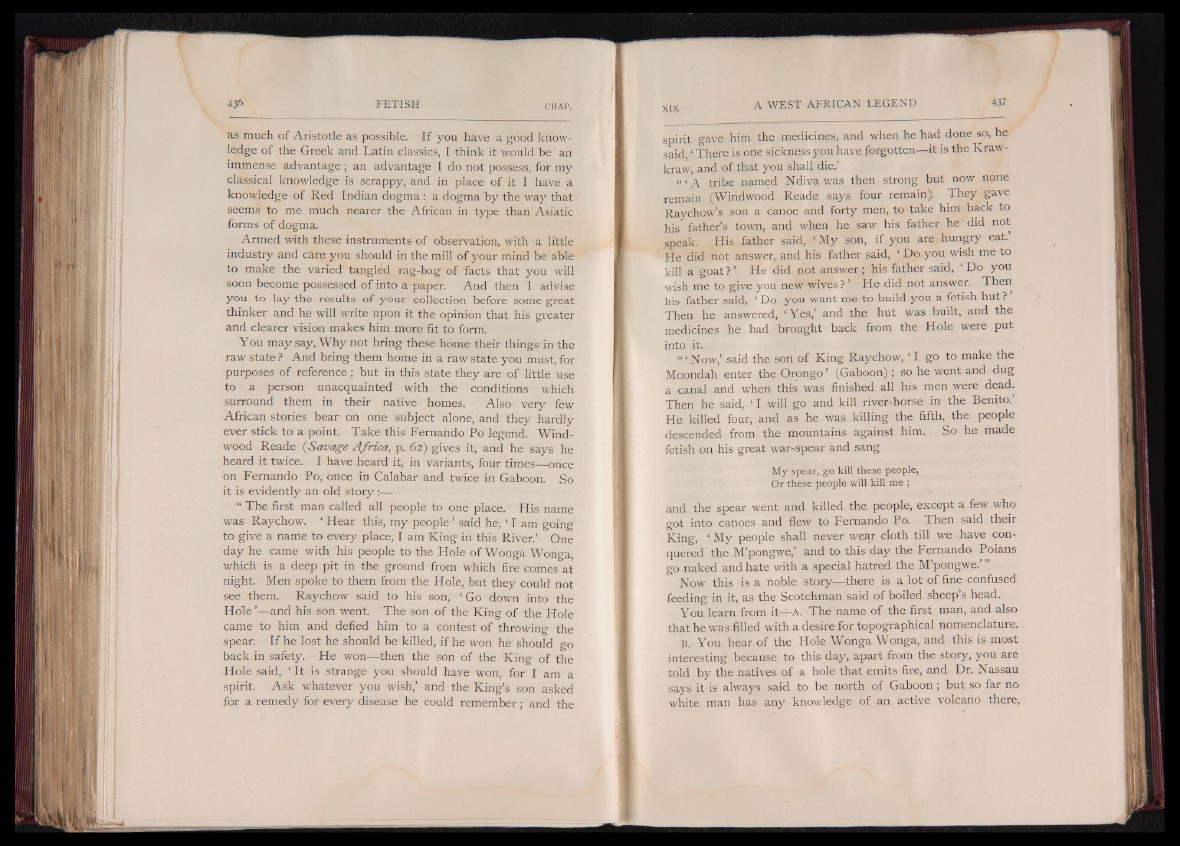
as much of Aristotle as possible. If you have a good knowledge
of the Greek and Latin classics, I think it would be an
immense advantage ; an advantage I do not possess, for my
classical knowledge is scrappy, and in place of it I have a
knowledge of Red Indian dogma : a dogma by the way that
seems to me much nearer the African in type than Asiatic
forms of dogma.
Armed with these instruments of observation, with a little
industry and care you should in the mill of your mind be able
to make the varied tangled rag-bag of facts that you will
soon become possessed of into a paper. And then I advise
you to lay the results of your collection before some great
thinker and he will write upon it the opinion that his greater
and clearer vision makes him more fit to form.
You may say, Why not bring these home their things in the
raw state ? And bring them home in a raw state you must, for
purposes of reference; but in this state they are of little use
to a person unacquainted with the conditions which
surround them in their native homes. Also very few
African stories bear on one subject alone, and they hardly
ever stick to a point. Take this Fernando Po legend. Wind-
wood Reade (,Savage Africa, p. 62) gives it, and he says he
heard it twice. I have heard it, in variants, four times— once
on Fernando Po, once in Calabar and twice in Gaboon. So
it is evidently an old story :—
“ The first man called all people to one place. His name
was Raychow. ‘ Hear this, my people ’ said he, ‘ I am going
to give a name to every place, I am King in this River.’ One
day he came with his people to the Hole of Wonga Wonga,
which is a deep pit in the ground from which fire comes at
night. Men spoke to them from the Hole, but they could not
see them. Raychow said to his son, ‘ Go down into the
Hole ’— and his son went. The son of the King of the Hole
came to him and defied him to a contest of throwing the
spear. I f he lost he should be killed, if he won he' should go
back in safety. He won— then the son of the King of the
Hole said, ‘ It is strange you should have won, for I am a
spirit. Ask whatever you wish,’ and the King’s son asked
for a remedy for every disease he could remember; and the
spirit gave him the medicines, and when he had done so, he
said,1 There is one sickness you have forgotten— it is the Kraw-
kraw, and of that you shall die.’
“ ‘ A tribe named Ndiva was then strong but now none
remain (Windwood Reade says four remain). They gave
Raychow’s son a canoe and forty men, to take him back to
his father’s town, and when he saw his father he did not
speak. His father said, ‘ My son, if you are hungry eat.
He did not answer, and his father said, | Do you wish me to
kill a goat ? ’ He did not answer ; his father said, ‘ Do you
wish me to give you new wives ? ’ He did not answer. Then
his father said, ‘ Do you want me to build you a fetish hut ?
Then he answered, ‘ Yes,’ and the hut was built, and the
medicines he had brought back from the Hole were put
into it.
“ ‘ Now,’ said the son of King Raychow, ‘ I go to make the
Moondah enter the Orongo’ (Gaboon) ; so he went and dug
a canal and when this was finished all his men were dead.
Then he said, ‘ I will go and kill river-horse in the Benito.’
He killed four, and as he was killing the fifth, the people
descended from the mountains against him. So he made
fetish on his great war-spear and sang
My spear,, go kill these people,
Or these people will kill me ;
and the spear went and killed the people, except a few who
got into canoes and flew to Fernando Po. Then said their
King, ‘ My people shall never wear cloth till we .have conquered
the M’pongwe,’ and to this day the Fernando Poians
go naked and hate with a special hatred the M’pongwe.’ ”
Now this is a noble story— there is a lot of fine confused
feeding in it, as the Scotchman said of boiled sheep’s head.
You learn from it— A. The name of the first man, and also
that he was filled with a desire for topographical nomenclature.
B. You hear of the Hole Wonga Wonga, and this is most
interesting because to this day, apart from the story, you are
told by the natives of a hole that emits fire, and Dr. Nassau
says it is always said to be north of Gaboon ; but so far no
white man has any knowledge of an active volcano there,